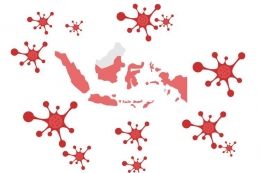Not only that, one of the most important is the President's Directives 4/2020 (Instruksi Presiden Nomor 4/2020) specifically instructing for refocusing of development activities, reallocation of government budget, and procurement of goods and services for rapid and accelerated response to COVID-19 (Refocussing Kegiatan, Realokasi Anggaran, Serta Pengadaan Barang dan Jasa dalam rangka Percepatan Penanganan Corona Virus Disease 2019) (President Directive (Inpres) 4/2020)
The regulations were issued after 13 March when the President established the Task Force. The head of National Disaster Management Agency (BNPB) was appointed as the commander. Prior to this Decree, national level response had been minimal as indicated by only two sectoral regulations were issued. First was the Health Ministry declaration of Novel 2019-nCov as a disease that outlines potential transform of COVID-19 into an outbreak and what can be done on 4 February 2019. Second, a national declaration of the specific emergency situation of COVID-19 by the head of BNPB on 28 February 2020.
The World Bank also provides has published recommendations to overcome the impact of COVID-19 in the economic sector. So that, Bank Indonesia (BI) as the central bank of Indonesia also issued a policy related to the impact of COVID-19. Bank Indonesia (BI) reduced the policy rate by 50 bps cumulatively in February and March 2020, to 4.5 percent. BI also announced other measures to ease liquidity conditions, including: (i) lowering reserve requirement ratios for banks; (ii) increasing the maximum duration for repo and reverse repo operations (up to 12 months); (iii) introducing daily repo auctions; (iv) increasing the frequency of FX swap auctions for 1, 3, 6 and 12 month tenors from three times per week to daily auctions; and (v) increasing the size of the main weekly refinancing operations as needed. BI also adjusted macroprudential regulation to ease liquidity conditions and support bond market stability. OJK has also relaxed loan classification and loan restructuring procedures for banks to encourage loan restructuring and extended the deadline - by 2 months - for publicly listed companies to release their annual financial reports and hold annual shareholders meetings.
As many of our countries are facing unprecedented challenges from COVID-19 the strain on our governments is extreme, and the impact on people all over the world continues to grow.
Baca konten-konten menarik Kompasiana langsung dari smartphone kamu. Follow channel WhatsApp Kompasiana sekarang di sini: https://whatsapp.com/channel/0029VaYjYaL4Spk7WflFYJ2H







